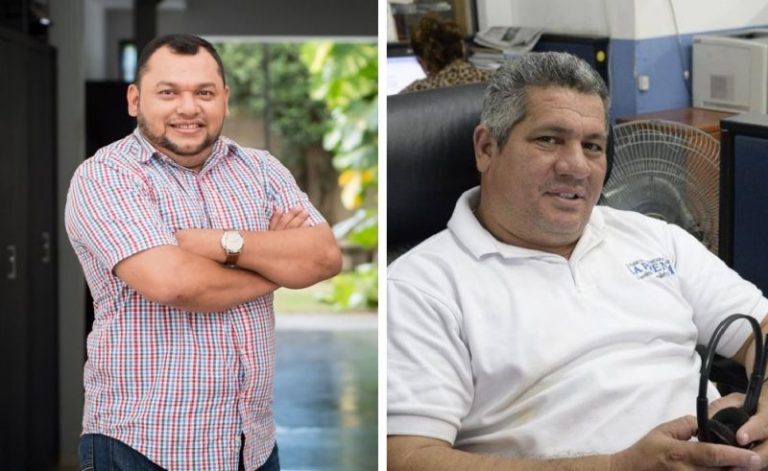1 de junio 2020

Children of Exile: The Births “Sowing Hope” in the Camp of Nicaraguan Farmers

PUBLICIDAD 1M
PUBLICIDAD 4D
PUBLICIDAD 5D
Alvaro Navarro y Emiliano Chamorro went from one private hospital to another seeking medical care, but intensive care units were overflowing

Journalists Alvaro Navarro y Emiliano Chamorro went from one private hospital to another seeking medical care
Alvaro Navarro, Director of Artículo 66, and Emiliano Chamorro, of Portavoz Ciudadano, visited various private hospitals on Wednesday, May 27th while suffering from Covid-19 symptoms, but emergency care services at these hospitals had already reached capacity.
According to a source close to Navarro, the journalist went to the Vivian Pellas Hospital emergency ward in the morning and chest x-rays were taken. Despite being in delicate physical condition, he was asked to seek care at a different hospital because he would need to be admitted into the intensive care unit (ICU) and “there wasn’t any room” at the hospital.
In search of a bed in another hospital’s ICU, Navarro was taken to 3 other private hospitals at which he was also turned away due to a lack of beds. It wasn’t until the evening when the journalist was admitted to the emergency room of the Monte España hospital, where he was given oxygen therapy due to difficulty breathing. He was later transferred to the ward for Covid-19 patients.
According to Artículo 66, the publication of which Navarro is the Director, the source of contagion is unknown. However, during the last few weeks, the journalist left his house only to go to the supermarket, the pharmacy and the bank.
A similar tragedy befell journalist Emiliano Chamorro, who became ill several days ago. When he experienced difficulty breathing yesterday, he was taken to the emergency room of a private clinic, where he had chest x-rays taken. The x-rays revealed profound deterioration in the condition of his lungs and the clinic recommended that he be transferred to a hospital.
In the afternoon, Chamorro was transferred to the Vivian Pellas Hospital where, once again, he was examined to confirm a diagnosis of Covid-19. After waiting several hours for the results of the tests, the doctors confirmed the diagnosis. There was, however, no room in the hospital, so he was sent home to self-isolate and take palliative care medication.
“We journalists must all take good care of ourselves, please. Protect yourselves. Sometimes we act like we’re invincible, sometimes we want to be made of iron, but we’re not. We’re vulnerable,” said journalist Emiliano Chamorro to La Prensa, the newspaper where he worked for fifteen years, until February, 2020.
Chamorro’s wife, Raquel Quintanilla, explained that several family members have Covid-19 symptoms, but Emiliano is the one in the most delicate physical condition. The damage to his lungs is due, in part, to the fact that “he smoked for many years” and the novel coronavirus “affected his lungs even more,” she said.
Martha Chamorro, the journalist’s daughter, is grateful for all the messages of solidarity for her father. “We couldn’t admit him due to the large number of patients in the hospitals. He is now going home with continued follow-up care from the Vivian Pellas Hospital, full treatment and a check-up to be carried out every 2 days in that same hospital due to pulmonary complications,” she said.
This Wednesday journalists Gustavo Bermúdez, of Radio Corporación and Lorenzo Larios, Director of Radio Periódico Libre, transmitted via Radio Sultana, in Granada, passed away. Both had Covid-19 symptoms and the Ministry of Health (MINSA) ordered expedited burials. Their death certificates, however, attribute their deaths to different causes.
The Writers and Broadcaster Journalists organization, PEN-Nicaragua, has reported that at least six independent journalists are infected with coronavirus. The situation of these journalists, whose names are being kept private, is quite complicated owing to “their inability to seek care in public hospitals because these hospitals, whose systems have already collapsed, fear suffering reprisals from health authorities”.
PEN-Nicaragua has also warned that the death of Gustavo Bermúdez is a “wake-up call in advance of the inevitable wave of coronavirus infections and deaths in Nicaragua, amid the Ortega government’s indolence. The government is bent on negating the existence of the illness and has rejected mandating social-isolation measures while actively promoting activities with massive attendance that cause increased contagion among thousands of Nicaraguans.”
Guillermo Medrano, from the Violeta Barrios de Chamorro Foundation, says that news coverage of the pandemic is carried out at great risk and many colleagues find themselves exposed to the virus, although the majority lack social security benefits to cover the cost of care in public hospitals or resources to cover the high costs of coronavirus treatment in private hospitals.
Medrano explained that journalists can’t adhere to the “stay at home” policy “because if independent journalists stay at home, unfortunately we’ll fall into an information blackout, and that’s not something we want to happen.”
According to the Ministry of Health, Nicaragua has 759 registered positive cases and 35 deaths due to the pandemic. However, the independent research group, Citizen Observatory COVID-19 has counted at least 3,725 cases, and 805 deaths.
PUBLICIDAD 3M
Confidencial es un diario digital nicaragüense, de formato multimedia, fundado por Carlos F. Chamorro en junio de 1996.
PUBLICIDAD 3D